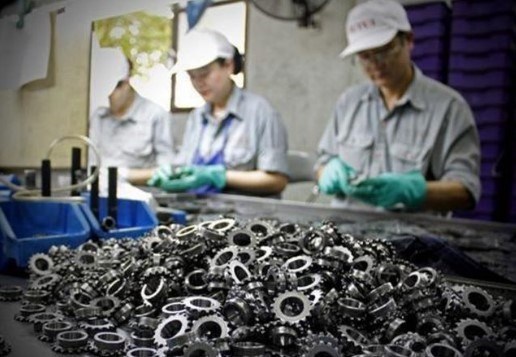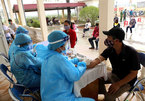 |
| Workers on a production line at Vietnam Engine and Agricultural Machinery Corporation's factory (Photo: VNA) |
The Japanese electronic device producer Canon has a total of 340 part suppliers worldwide and 147 of the total are located in Vietnam. However, only 20 companies are Vietnamese-originated and that number has remained still for several years.
“The localisation rate of Canon Vietnam products is 65 percent but it mainly comes from Vietnam-based foreign direct investment (FDI) suppliers and from our processing factories,” Dao Thi Thu Huyen, senior manager at Canon Vietnam, told a conference on sustainable development for Vietnamese small- and medium-sized enterprises (SMEs).
In the company’s portfolio, 59 spareparts should be produced by local suppliers including complicated, metal components, she said, adding that most locally-owned companies focus only on printing, packaging, and plastic and palette production.
That is the problem with local suppliers that international companies like Canon have to face when setting up their businesses in Vietnam.
It was difficult for local suppliers to meet technical standards set by foreign companies, said Nguyen Anh Tuan, head of strategy development at Samsung Vietnam.
“It is even harder to ask them to upgrade production technology and the factory as they have scarce capital,” he said. “Only 0.2-0.3 percent of their total revenues is spent on research and development (R&D).”
Meanwhile, other issues that Vietnamese also faced included labour treatment, on-time salary payment, environmental protection, and credit risk management, he warned.
Huyen and Tuan urged local firms to think beyond the existing foreign companies like Canon and Samsung as there are others with demand for entering Vietnam.
“Confidence is all that matters,” Panasonic Vietnam’s global procurement head Hoang Thu Thuy said.
Vietnamese suppliers should be disciplined and they should be committed to the agreements and strive hard to beat the expectation in the short term, she added.
According to Tran Duy Nhat, CEO of JAT Autoparts and Industry Equipment Production JSC, locally-owned suppliers lack fundamental technologies and raw materials to meet the demand of customers.
They needed technical assistance from both Government and partners to improve product quality and reach international markets’ standards, he said.
Vietnamese companies were currently weak and limited in terms of production capacity and price competitiveness when joining the global value chain, said Nguyen Chi Dung, Minister of Planning and Investment.
Local SMEs were unwilling to take risks to further develop because the quality of corporate governance, technology and personnel was limited, he said.
Government, ministries and government agencies must assist them to join global value chains while foreign direct investment (FDI) companies should make some room in the market to allow local firms to compete, the minister urged.
As the world was struggling with the COVID-19 pandemic, Vietnamese firms should look beyond their traditional markets and explore new territories as international corporations were seeking new resources that meet their requirements, Dung said./. VNA

Young researcher shares his passion for AI
When he was a student at university, Hoang Trung Hieu had eight scientific journals presented at international conferences.

Vietnamese and Japanese researchers develop test kit for SARS-CoV-2
Fifteen researchers from Vietnam’s National Institute of Hygiene and Epidemiology and Japan’s Nagasaki University have successfully produced antigens to develop quick test kits for SARS-CoV-2.